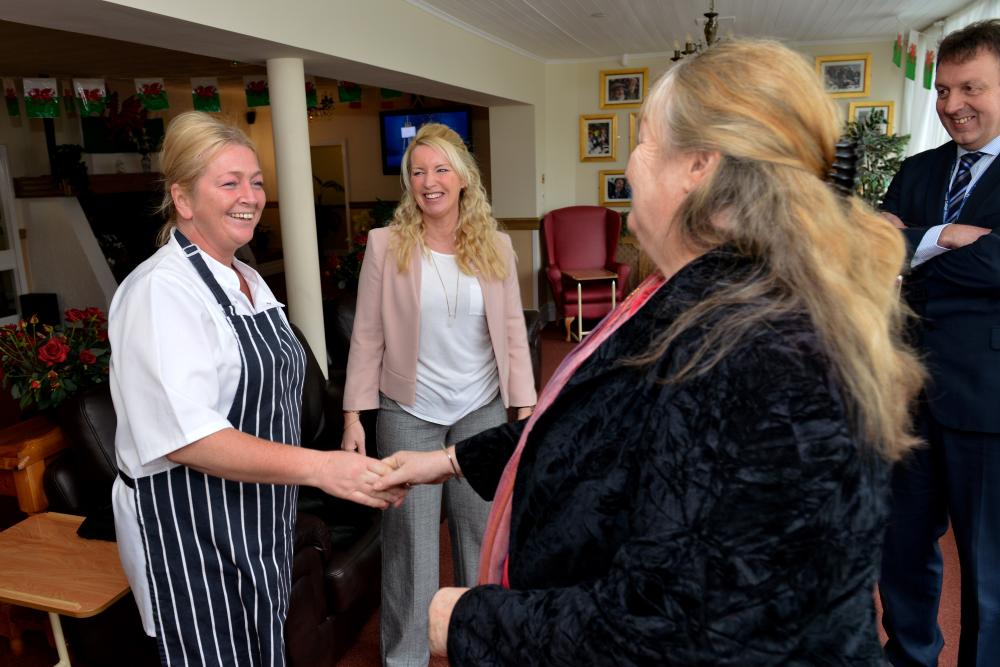Minister sees local benefits of Skills for Industry investment
Skills for Industry (SFI) is supported by the European Social Fund through the Welsh Government, and aims to increase the skills levels of employed individuals by supporting the delivery of training through a wide range of courses and qualifications.
The project, in the past three years alone, has benefitted over 5700 learners and 1500 employers in the South West Wales region and continues to go from strength to strength.
Julie James, the Minister for Skills and Science, was able to see the benefits of SFI investment at first hand when she visited Hengoed Care in Winch Wen, Swansea.
Tim Williams, the Director of Hengoed Care (which incorporates Hengoed Court and Hengoed Park Care Homes), currently manages around 250 staff with varying skill sets and has worked alongside Gower College Swansea’s GCS Training department to provide qualifications for his workforce in management, catering, housekeeping and social care.
“Staff development is vital to the running of a successful business,” says Tim. “My team are very happy with the training they have received from the SFI Project via GCS Training and, as they progress through the levels, they are happy to work with familiar faces with whom they have formed a real bond. As the educational levels of my staff are so different - in some cases staff are coming back to formal training after a break of many years – GCS Training has been excellent at adapting to suit the needs of each individual which, in turn, has really helped to build their confidence.”
Another local employer to benefit from the initial phase of SFI is Lynne Pearce who manages Ocean View, a fully working farm and successful wedding venue in North Gower.
“I have found the training packages offered by Gower College Swansea to be very flexible and ideal for my needs,” says Lynne, whose employees have completed several qualifications thanks to SFI funding. “For example, many of my staff are students and are only around at the weekend but GCS Training was happy to cater to them and ran courses exclusively for them outside of the ‘normal’ working week.”
“We are very excited to continue the excellent work we have undertaken with the Skills for Industry project so far, developing the skills of the local workforce and encouraging the private sector to invest in the growth of the Welsh economy in line with the Welsh Government’s co-investment strategy,” says Gill Davies, Director of Skills and Business Development at Gower College Swansea. “The feedback we have received, both from employers and from learners, has been extremely positive.”
As Skills for Industry moves into its second phase, it will continue to be delivered through the collaborative partnership of Gower College Swansea (the lead partner), Neath Port Talbot Group of Colleges, Coleg Sir Gar, Pembrokeshire College, Coleg Ceredigion, University of Wales Trinity Saint David and Addysg Oedolion Cymru | Adult Learning Wales.
Minister for Skills and Science Julie James, adds: “Improving skills attainment, particularly higher level skills in priority sectors which are aligned to economic needs and growth in Wales, is a key priority for this government and we are committed to working with industries and academia to further strengthen this important area.
“It is great that more than 5700 learners and 1500 employers in the South West Wales region have already benefitted from this programme and encouraging to hear Tim and Lynne’s accounts about how Skills for Industry has personally helped them.”
http://www.skillsforindustry.co.uk/
ENDS
Notes:
Skills for Industry provides a strategic approach to the delivery of workforce development, encouraging productivity and progression in employment, increasing the number of people in the workforce in West Wales and the Valleys with technical and job specific skills, from Level 1 to Level 7.
Skills for Industry targets the demand for skills to support organisational growth, adaptability, and high performance working across the occupational sectors such as energy, construction, creative industries, science, advanced manufacturing, ICT, auto motive, engineering, financial and professional services, care and tourism.
Programmes can be tailored to meet the individual training needs and requirements of employers across a wide range of subjects and areas. Training will be delivered using a variety of delivery methods including delivery at the Colleges’ facilities, ‘on site’ at employer premises or through blended learning techniques.
Each partner college has a dedicated team of staff to assist regional employers identify their specific training and development needs, and customise provision to meet those requirements. Through the support of ESF funds, training will be delivered in the most appropriate manner to the employer and participant at an affordable cost.




